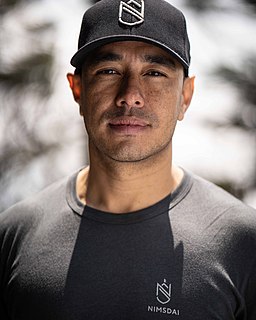Top 38 Quotes & Sayings by Nirmal Purja
Explore popular quotes and sayings by a British athlete Nirmal Purja.
Last updated on April 21, 2025.
I convinced my wife to let me climb Everest. I emptied my savings and took out a loan so I could afford to make the trip. I wanted to do it solo and I pushed myself too hard. I was carrying too much gear and got altitude sickness. I meditated to the point where I was feeling better, but didn't make it up, because I got involved with a rescue.






















